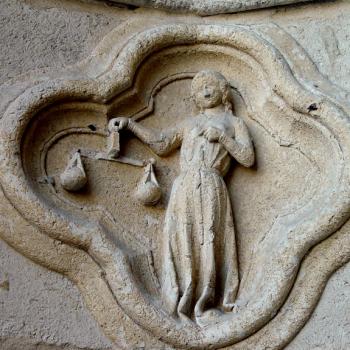
Love is humble, not proud, which is why it should not surprise us that God’s greatness is best revealed to us in the incarnation and not by coming to us in a form or activity which lies beyond our comprehension. That is, God humbly embraces human nature as the normative means by which the divine glory would be revealed to us, showing us, as St. Stephen of Muret suggests, that there is a place for us with God in heaven, in eternity, because God has already found a place with us in our temporal existence:
God is going to enable us to reign with him in Heaven forever. Now, there is one reason above all others why we can believe this: because the Lord humbled himself so completely as to dwell in us, who are only clay pots, and to dwell in this world.[1]
God’s loving humility makes sure there is room for us in the divine life so that we can participate in it in the eschaton. While, it is true, God is so great, God is incomprehensible to us, a mystery which we will never fully comprehend, what we do not know about God should not make us terrified. We should not feel any fear in relation to the great unknown of God because what we do know, what God has revealed to us, is that at the heart of divine transcendence is divine love, a love which reaches out to us to help us and do us good. God’s love for us is as great as God is, for God is love, and what God is, God does. God is always engaging us with love, approaching us in a way which allows us to apprehend the divine nature without being pulverized or squashed by it. For, as Christ has shown us, God’s great love does not come to us to annihilate or destroy us, but to save us and let us become adopted children of God.
When we look to Christ, seeing how God comes to us in a humble, merciful love, we not only learn about God, but also the way God wants us to be in the world. To be good, to do good, we must imitate Christ, not, of course, in every accidental detail (since we cannot do that), but in the way Christ showed us that everything should be done in and with love. God’s goodness is one with God’s divine love (as God is simple). When we follow the way of love, when we live it out, we embrace the source and foundation of love itself, which is God, and in doing so, we share in God’s goodness because where divine love is found, goodness is also found. The more loving we are, the more goodness will be found in us. This is what indicates the truth of St. Stephen’s suggestion that if someone has integrated God’s goodness in them, that is, if someone can be said to be good (in a relative sense), it is because they show how merciful they are, for that mercy comes out of love:
In many respects a bad person is like a good one. Both of them can keep vigil, give alms, and all sorts of other things like that. But only the good person can forgive from the heart; a bad one cannot.[2]
Bad people are not incurably evil because no one is inherently evil. Pure, absolute evil cannot exist; even the worst person will have some good in them, good which God can and will use for their salvation (if and when they are willing to open themselves up to God and God’s merciful love). Indeed, those who do evil do so, not because they think it is evil, but because they perceive some good which they want, thinking that goodness justifies their actions. The good, however, is limited, and often is for themselves alone; for them to attain what they want, many others will have to be sacrificed or hurt for them to get it. What is good, therefore, can be used and abused for evil. We can see this with religion. Religion is good, but it is often abused by people who use it as a tool to manipulate and control others. Those who do this might believe, they might not, but they will use the externals of religion, like its rituals, its prayers, even its theology, as a tool to make themselves look good in front of others, while ignoring the true power of religion, the internal transformation which religion is meant to establish in them. They will try to look like great people, worthy of honor and respect, because of the way they embrace the externals, an embrace which leads them to be legalistic with the externals, not understanding the spirit which is intended to be had with them and the way they can and should change over time. They can read, study, worship, sing songs, teach others, say the right things, but despite all of that, they can be far from good, because it is all external, all a show. They have not allowed themselves to be challenged, to die to themselves (in the way the path of love expects them to do so) in order to be changed for the better. They are not merciful. They are not loving. They are abusive and manipulative. They will use their embrace of externals as a way to have people honor and respect them, and then use that honor and respect to manipulate and control others, and in doing so, show themselves far from good, far from being faithful to God and God’s way.
To be good it to be like God. We are not going to be good in and of ourselves, but only in relation to the way we have integrated ourselves and participate in God’s goodness, which is not other than God’s merciful love. This is how we deal with the paradox which says only God is good, and yet we can and do call many people good and holy for what they have done. God is not other than goodness, for God is the only source of God’s own goodness, while everyone else finds their goodness, their nature, their existence, is something which is given to them apart from themselves. God is good, will always be good without change, without any chance of ever embracing and doing something which stands against that which is good. We are good only in a derivative fashion. Our nature, which is good, is predicated to us, that is, given to us by God, and it is something which is contingent, meaning, it is something which can changed based upon what we do and how we integrate ourselves to God’s goodness. To grow in goodness, we must embrace the path of love, the path of humility. When we do so, our love will have us see the good which is found in others, no matter how great or small that good is, and use that to lift them up, while at the same time, we will look inside ourselves and discern what ways we can become better, seeking God’s help to do them. Sometimes, as St. Stephen and others recommend, if we find pride a problem, we should (at least for now) look at others as our superiors; when we do that, we will find we will no longer be judging them in ways which hinder our relationship with them:
Whenever you catch yourself starting to complain about someone, you would do well to turn inward and inspect your own thoughts and deeds. And, when you have thoroughly done this, you will discover that the person you were grumbling about is far ahead of you in the race.[3]
If we follow this suggested method, this discipline, we must be careful and not use it to undermine ourselves and our own goodness; we must not end hating ourselves, unable to forgive ourselves the way we forgive others. If we find ourselves mistreating and abusing ourselves, we should begin to look upon ourselves as an outsider so that we can treat ourselves as a neighbor, giving ourselves the same humble love and forgiveness which we give to others. Then, when we can do that, as we continue to love and help others, we will find ourselves following the path of love, the path which opens us up to God so that God’s goodness can dwell in us, making us good by grace.
[1] St. Stephen of Muret, Maxims. Trans. Deborah van Doll OCD (Kalamazoo, MI: Cistercian Publications, 2002), 46 [XVIII].
[2] St. Stephen of Muret, Maxims, 108 [LXXV.1].
[3] St. Stephen of Muret, Maxims, 61 [XXXIVI.2].
Stay in touch! Like A Little Bit of Nothing on Facebook.
If you liked what you read, please consider sharing it with your friends and family!
N.B.: While I read comments to moderate them, I rarely respond to them. If I don’t respond to your comment directly, don’t assume I am unthankful for it. I appreciate it. But I want readers to feel free to ask questions, and hopefully, dialogue with each other. I have shared what I wanted to say, though some responses will get a brief reply by me, or, if I find it interesting and something I can engage fully, as the foundation for another post. I have had many posts inspired or improved upon thanks to my readers.













